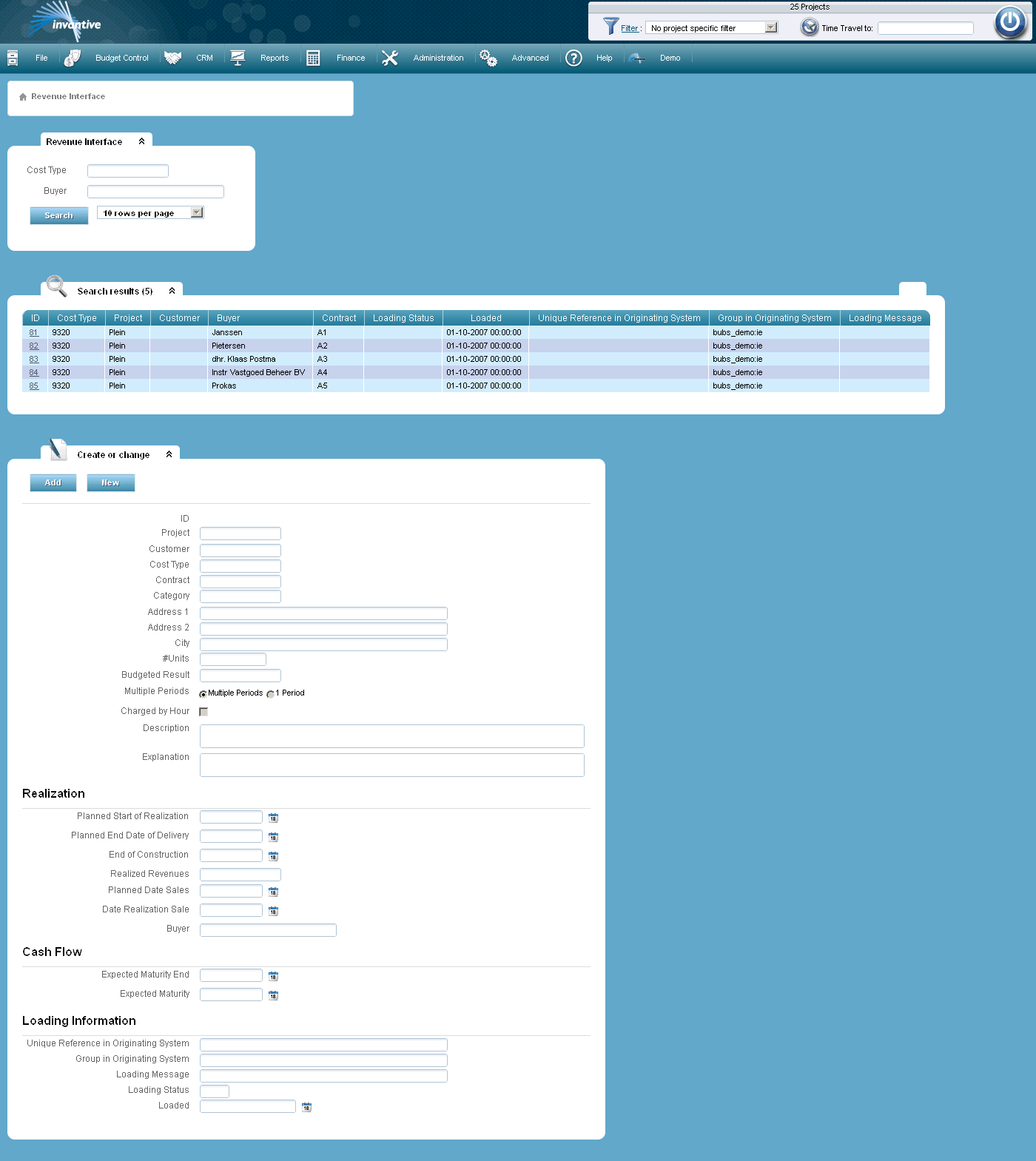Using this screen revenues can be exchanged with an ERP system. Open Form
Open Form

The meaning of the entry fields is:
Project |
The project of which the revenue is part of. A combination of project code and project name. |
Cost Type |
The cost category on which the revenue is registered. Often different cost category are used for different types of units. Only cost categories can be chosen from the master roll up of the type ‘Revenues’. |
Contract |
The contract for the grouping of a revenue. Two revenues cannot share the same contract. |
Category |
The type of revenue. See also Revenue Types. |
Address 1 |
The address where the revenues are earned. |
Address 2 |
An alternative address where the revenues are realized. |
City |
The place where the revenues are realized. |
#Units |
The number of units, expressed in units related to the category. Houses are generally expressed in ‘Numbers’, while ‘Commercial Space’ is expressed in ‘m2’. |
Budgeted Result |
The budgeted result of the unit. |
Multiple Periods |
An indicator if more than one invoice will be sent in order to charge the agreed revenue. In case ‘1 period’ is selected and the field ‘realized revenues’ is not entered or entered differently, the first invoice of this revenue will be treated as the realized revenue. |
Charged by Hour |
The activities will be charged by hour if selected. |
Description |
A description of the products, activity or situation where revenues relate to. |
Explanation |
An informative explanation such as the expected start or duration of the rental period. |
Realization |
|
Planned Start of Realization |
The planned date to start realization. |
Planned End Date of Delivery |
The planned date of handover of the units. |
End of Construction |
The actual end date of construction of the units. |
Realised Revenues |
The realized revenue per unit. This is filled out as soon as the contractual agreement is signed. Note that reports may show a different contract revenue as entered here if ‘1 period’ is selected in the field ‘Multiple Periods’ and an invoice with contract is sent. In this case the reports will always show the total invoice amount instead of the here entered realized revenues. |
Planned Date Sales |
The expected date that the customer will sign the sales contract. |
Date Realization Sale |
The date when the sales contract was signed. |
Buyer |
The name of the buyer. |
Cash Flow |
|
Expected Maturity End |
The date the cash flow for this revenue is expected to finish. The maturity date is only relevant if the cash flow projection method needs it. |
Expected Maturity |
The date the cash flow for revenue is expected to begin. |
Loading Information |
|
Unique Reference in Source System |
Reference with which the record in the system of origin can be identified. |
Group in Originating System |
Reference to a group of records in the system of origin. The grouping of records is often used to validate the loading process using ‘application control’. |
Loading Message |
Displays status information about the loading process of the record. |
Loading Status |
Displays status information about the loading process of the record. ‘E’ = ‘Error’ and ‘C’ = ‘Completed’. The completed load statuses will be automatically deleted at the end of the ERP processing. |
Loaded |
The point of time the record was loaded by the ERP interface. |
The meaning of the other fields:
Id |
The technical code with which the revenue can be identified. |
 Invantive Estate
Invantive Estate